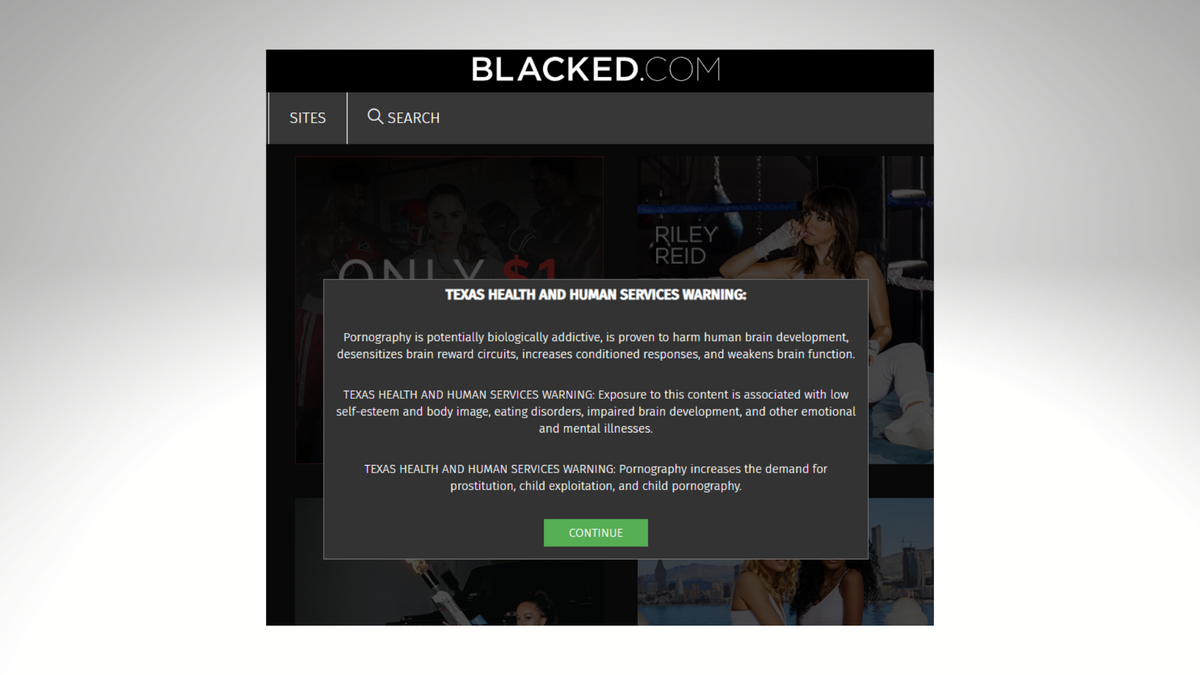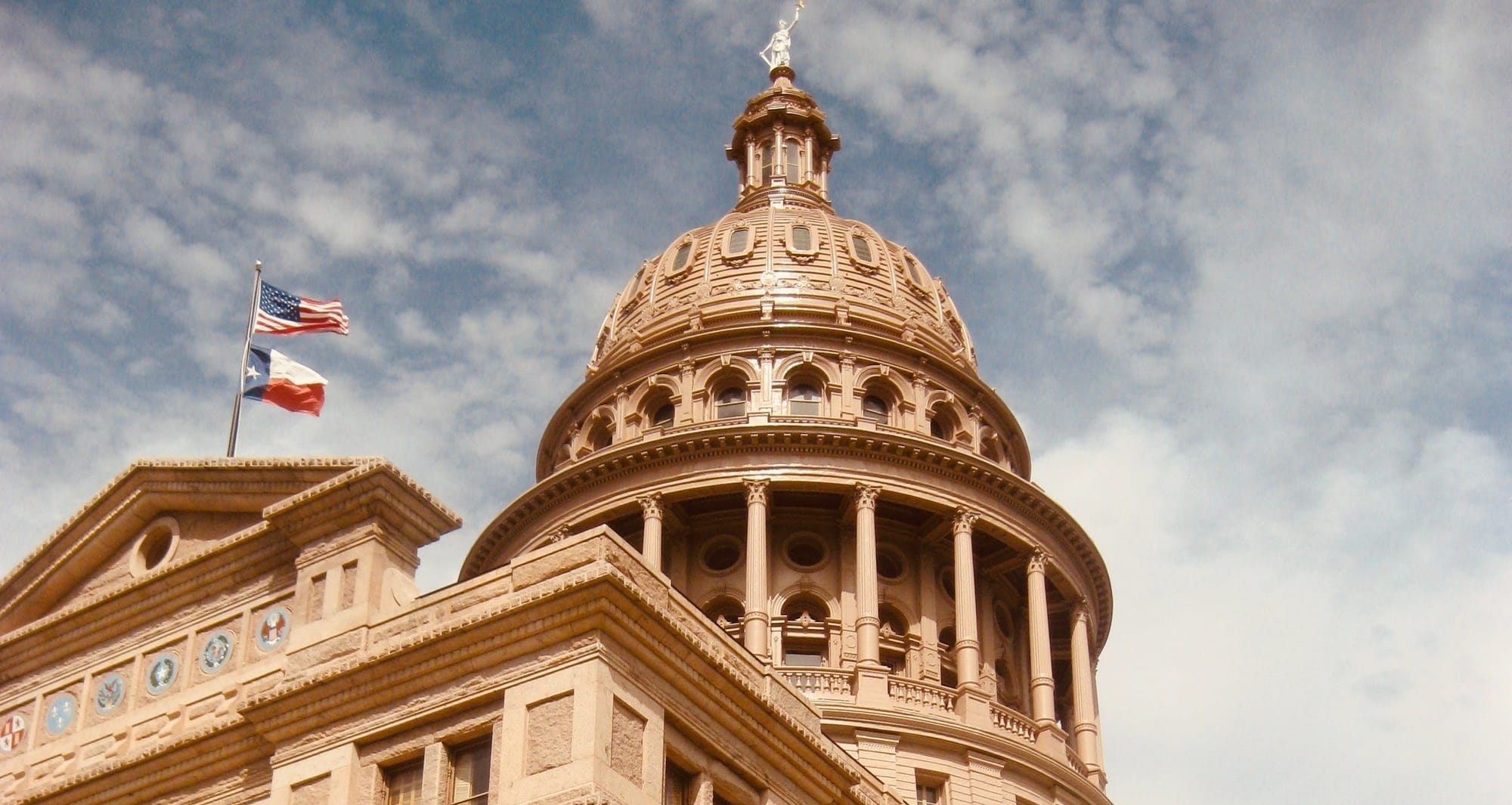Last year, Texas governor Greg Abbott signed an age verification law that makes broad, specious claims about porn as a public health crisis.
Seven other states have enacted nearly identical laws in the last year, including Montana, North Carolina, Virginia, Louisiana, Arkansas, Mississippi, and Utah. But Texas’ law includes a requirement that the others don’t: sites must display a warning, in at least 14 point font, from Texas Health and Human Services claiming that pornography is addictive and weakens brain function, among a list of other catastrophic physical and social harms:
“TEXAS HEALTH AND HUMAN SERVICES WARNING: Pornography is potentially biologically addictive, is proven to harm human brain development, desensitizes brain reward circuits, increases conditioned responses, and weakens brain function.
TEXAS HEALTH AND HUMAN SERVICES WARNING: Exposure to this content is associated with low self-esteem and body image, eating disorders, impaired brain development, and other emotional and mental illnesses.
TEXAS HEALTH AND HUMAN SERVICES WARNING: Pornography increases the demand for prostitution, child exploitation, and child pornography.”
These claims aren’t just unscientific and unproven. Texas Health and Human Services Commission claims it has nothing to do with them. Not only that, in response to a public records request from 404 Media, the agency told us that it has no records of communicating about the warning or about this law in any official capacity.
404 Media filed a public records request seeking any communications HHSC had about the warning, the law, or the science around it: “HHSC has no responsive documents,” we were told.
We also emailed the press office for Texas Health and Human Services, and asked if these statements were written or confirmed by them, or if the department was consulted in crafting those statements.
“Please refer to the authors of this bill for more information,” the press officer replied.
In Texas, this law has been at the center of a tug of war between the porn industry and the state. A group of adult entertainment activists and companies, including Pornhub, XVideos, and XNXX, sued the state of Texas in August, claiming that the law was unconstitutional. A district judge agreed to block it from being enacted as scheduled, writing, “If the interest is in changing adults’ attitudes on porn and sexuality, then the state cannot claim a valid, substantial interest.” But Texas’ Office of the Attorney General, Ken Paxton, appealed the court’s injunction with the Fifth Circuit, which issued a stay of the injunction.

Briefly, before the injunction or the law’s enactment but after it was passed, some porn sites started showing the required health warning on their homepages.
Those sites have since taken the warning down. Mike Stabile, spokesperson for the Free Speech Coalition, one of the groups that’s brought the lawsuits against Texas, told 404 Media that despite the stay on the injunction, the law isn’t being enforced — and age verification laws around the country, in the seven other states where they’re currently enacted, aren’t being enforced, either.
“The lack of enforcement calls into question whether this is at all the crisis the legislators and religious censors have claimed it is,” Stabile said. “All we hear in the press is how access to adult content is devastating lives, and a public health crisis, but it's been a year since Louisiana went into effect and there's been no legal action at all — not from parents, and not from attorneys general. It's almost like they know it's unconstitutional and prefer the chilling effect to a court ruling.”
For journalists trying to pry information out of a government agency, contacting the press office for elected officials doesn’t achieve the same goals that filing FOIAs does — the former might get you a comment, and if you’re lucky it’s an interesting or revealing one (it rarely is, and more often is an exercise in corporate ass-covering). The latter, however, might turn up what the agency would prefer the public didn’t see but is nonetheless entitled to knowing about: cops chasing Pokemon instead of responding to calls, or school superintendents complaining about bad policy, or AI-powered border patrol deals.
FOIA is a powerful tool for exposing the internal struggles of institutions that shape public life, but it’s not easy. Sometimes, agencies demand thousands of dollars to complete requests, and often take months or years to fulfill them, or ghost on requests entirely.
Which brings us back to Texas’s response to our request for records pertaining to HB 1181. The Health and Human Services Commission claims it has no responsive records pertaining to HB 1181. Even if HHSC was not involved (which would perversely make sense given how horrible the warnings are), it defies belief that they have zero documents or communications about the law.
In fact, we know that there should be documents that match our requests, because other journalists have emailed the Texas HHS office about HB 1181: In August, adult industry news outlet XBIZ reported that it received the same non-answer from the press officer. This email exchange itself should be a responsive record.
We filed similar requests with health agencies in other states that have passed age restriction laws and which were also apparently not involved in the implementation of those laws in any way. In those states, we at least got a handful of documents back in which health services employees had subscribed to newsletters that mentioned the law, mailing lists about the law, or internal discussion about the law.
Just in case any other public health agencies in Texas were involved, we sent requests to others, too: The Texas Department of State Health Services responded with no documents, and said that it was “not involved in implementing this law and so does not have any responsive records.”
So, if the health departments of states aren’t talking about pornography, why are these laws claiming it’s bad for your health? We have filed an appeal challenging the idea that Texas HHSC has no documents about this and will update everyone when we hear back. We also have public records requests out to other agencies in Texas that are still pending.



